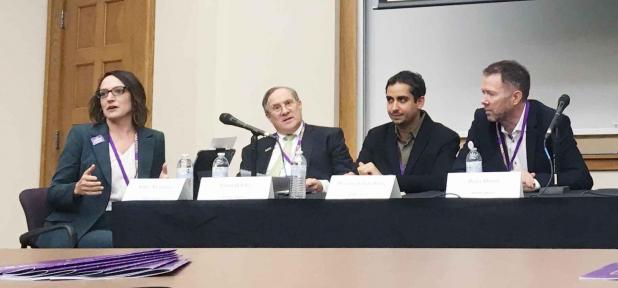
LSU Manship School News Service/Mary Chiappetta
Moderator Ashley Arceneaux speaks recently at an LSU panel discussion. She's shown with, from left: panelists Chris D’Elia, Prosanta Chakrabarty and Peter Doran, who discussed science in times of political polarization.
Scientists decry politicization of information
BATON ROUGE—Residents of Louisiana could pay the price for increasing politicization of science communication as the coastline sinks and oceans rise, several experts said.
“Very often, the press gets its information about science from politicians,” Chris D’Elia, dean of LSU’s College of the Coast & Environment, said during a panel discussion. “This immediately polarizes people on the issues.”
According to D’Elia, the sinking coastline leaves Louisiana particularly vulnerable to the effects of sea level rise related to climate change. He likened the state to a person standing in an elevator that is descending as water rises around it.
“There are no climate refugees in the Mississippi delta, yet.” he said. “The problem we face now is the sinking of the land, not the static rise of sea level. That’s to come."
D’Elia spoke during LSU’s Behind the Ballot Symposium, a series of discussions about voting and other political issues .
Climate change has become an increasingly political issue during the Trump administration. Besides the president’s plan to withdraw from the Paris Agreement, an international agreement to address climate change, the administration has openly questioned the human impact on climate change.
These attitudes worry scientists, said Prosanta Chakrabarty, an evolutionary biologist and curator of ichthyology for LSU’s Museum of Natural Science. He served as program director for the National Science Foundation at the start of the Trump administration.
“During the administration change, there was a big concern about what the future of science in the U.S. looks like, what will happen with funding for science and basic science research,” he said.
Surveys indicate nearly all climate experts agree that climate change is happening, and they are exploring ways to mitigate the risks from it, panelists said. According to D’Elia, this level of consensus is unusual and telling.
“The history of science is full of people who don’t agree,” he said. “Scientists have ample opportunities to disagree, and we like to take those opportunities/"
Politicization of science issues like climate change or vaccine safety produces greater distrust in science than other nonpoliticized issues, like medical developments, according to a 2016 Pew Research study.
People tend to move toward information that confirms what they already believe, panelists at LSU said.
“The public finds their truth in people they trust,” said Chakrabarty said.
“When people are on social media, and they see a person that they trust posting about being anti-vaccination, if they see that enough times that becomes ingrained in what they think is true,” he said.
Politicization of science issues can also hinder
scientific developments.
“Scientific advances are inextricably tied to trust in science,” said Ashley Arceneaux, LSU’s director of presidential and policy communications and the panel moderator.
“Funding for science comes from taxpayer dollars, and those taxpayer dollars come from people like us who are easily polarized, weaponized or given false information,” she said.
To combat politicization of science issues, D’Elia said, experts should work closely with politicians to try to ensure the information they communicate to the public and the press reflects the science.
“Advocate for data, not for a side,” Chakrabarty said. “Politics don’t change the data.”
